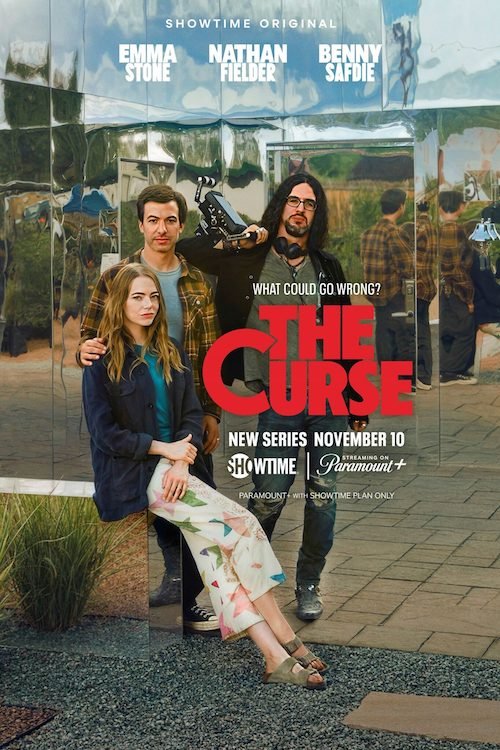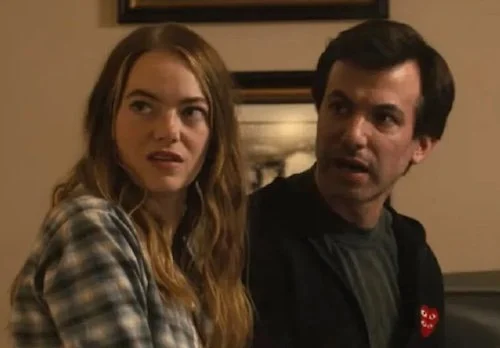The Curse Season 1: Binge, Fringe, or Singe?
Written by Andreas Babiolakis
Binge, Fringe, or Singe? is our television series that will cover the latest seasons, miniseries, and more. Binge is our recommendation to marathon the reviewed season. Fringe means it won’t be everyone’s favourite show, but is worth a try (maybe there are issues with it). Singe means to avoid the reviewed series at all costs.
Jazz legend Alice Coltrane was known for her harp and piano skills as she performed dizzying orchestrations that felt unachievable by mere mortals. Before she released the bulk of her most beloved albums, Coltrane was starting to study Hinduism, take the mantra diksha, take on the new name Swamini Turiyasangitananda, and give up a life of secular means; this was all in the seventies, with her magnum opus, Journey in Satchidananda, marking her new life via avant-garde jazz bliss. She needed to reach the highest of highs still, and by 1982 she ditched the music of old — at least just for a short while — to take on devotional music fully. Now an official spiritual leader for Hinduism, Coltrane found new responsibilities in her music. She exchanged her harp for her own singing voice (something she hadn’t recorded before) as she chants in Sanskrit on Turyia Sings: one of the great new age, ethereal listening experiences that will make even the coldest atheists feel their spirit be cleansed. Coltrane prays to be connected with the spiritual world, find peace in being removed from the physical, material world, and achieve harmony within her soul. Modern remasters of Turiya Sings don’t have the same synth and string compositions on them because the original masters were never found. Thus the album has never existed quite as powerfully as it did in its original form. Even so, an attempt was made with the 2021 remaster Kirtan: Turiya Sings, which is still an incredibly moving musical experience, but this feels more like the resurrection of an incomplete masterwork than anything else; and yet Coltrane’s spirit still shines.
Two tracks off of Turiya Sings, “Jagadishwar” and “Jai Rama Chandra”, make multiple appearances in The Curse: a disconcerting satire series affiliated with A24, Showtime, and Paramount+ that follows a married couple in urgent need of a greater purpose in life; the use of Coltrane’s songs bring home the point that it is possible to achieve fulfilment if you concentrate your mind and soul hard enough. Asher and Whitney Siegel are too focused on the outside noise to truly become better people and to empower one another despite their various endeavours that are meant to prove they are great people. This couple is set to star in a new HGTV show Flipanthropy, where they not only help struggling citizens have better housing conditions, but they set them on the right path by assisting them with careers and other benefits. On paper, the Siegels are saints. However, The Curse dives into their baggage and the artificiality of reality television, better living methods, and even the sanctity of marriage. The composer of the show’s score, Daniel Lopatin of Oneohtrix Point Never fame, crafted an eerie theme song that feels like Coltrane’s religious hymns sent through a processor, indicating that these are distorted visions of chasing enlightenment: these characters are doing more damage than they are good. With Coltrane’s ambient prayers being used effectively via soundtrack dissonance, we feel the weight of the failures of our protagonists as they try to be good people but only wind up being more and more corrupt in this conquest.
The Curse forces its viewers to grapple with the synthetic perspectives of reality that television projects on pop culture.
The names Nathan Fielder, Benny Safdie, and Emma Stone are heavily ingrained in modern-day cinematic and television excellence. Fielder formerly used his comedic chops for laughs with Nathan For You until that series’ finale “Finding Frances”, where he blurs the line between fiction and reality better than most ever have. He furthered this experimentation with his series The Rehearsal: an insurmountable take on the human experience and how everybody on Earth is an actor in their own play. Safdie is a beloved director with brother Josh, and the duo have made some of the most nerve-wracking films in recent memory (particularly Good Time and Uncut Gems); Benny is also a rising actor who has showcased his chameleon capabilities. Stone needs no introduction after her many accolades, but it’s clear that she game for anything. These three minds collide in The Curse to such effective degrees. Fielder’s converging of fiction and reality, Safdie’s focus on anxious storytelling within communities dealing with financial and political pitfalls, and Stone’s celebration of eccentricity and bold acting all make The Curse as top-notch of a series as it can be.
Fielder is Asher: a slimy man who is trying his damnedest to be likeable (or at least “funny”) who clearly suffers from inferiority complexes (The Curse is sure to let you know in incredibly invasive ways at times). His wife is Whitney (Stone) who is on this crusade to turn Española, New Mexico into an area full of homes that are built to reduce ecological footprints, energy costs, and other green alternatives. These model homes are fully innovative in outrageous ways; their exteriors are completely mirrored to retain heat, for instance, and yet I can’t help but see them as reflections of those trying to look into the domicile while also seeing the actual state of this area and its surroundings. Although a smaller part, Safdie is Asher’s friend, television producer Dougie Schecter, who cannot stop taking liberties on what footage gets shot for Flipanthropy. On TV, Asher and Whitney Siegel are smarmy, cheesy, overly polite mannequins with wide smiles. That all changes when the cameras are off; what Dougie makes of this footage is even more synthetic.
While The Curse is clearly different than Flipanthropy, the majority of the series is shot to feel like B-roll footage for the latter show, as we peer through windows, glance via mirrors, and even use more obscure methods to spy on the Siegels. We invade their privacy at all times, and this makes any vulnerable or confrontational moments hurt all the more to watch. While a clear acting exposition for Stone and Safdie who are known for their chops, The Curse is a revelation for Fielder fans; if he is so good on this show (and he is damn good to the point that he brought tears to my eyes during this first season), how much of his previous series is put on by him? Only Fielder can dominate in one project to the point that you question his other work for the better; his experiments in Nathan For You and The Rehearsal have gained another layer each. The Curse zips between a home being used as a set and the secret moments the world isn’t meant to be seen, and all sequences are edited together to make both natures feel almost identical. The majority of The Curse feels uncanny to the point of being eerie, unsettling, and incredibly awkward; it is some of the best discomfort you’ll feel in 2023.
Why should you feel uncomfortable? The Curse promises to take on some difficult conversations head-on, particularly gentrification, colonialism, the falsehoods of reality television, and the illusions of what a marriage should look like. In almost every single scene, you are placed in scenarios that you will feel like you are imposing on, whether it’s Dougie’s addiction and self-loathing, Whitney’s problematic parents and their history, and Asher’s battles with his own inequities. Furthermore, we get to the crux of the series with a family that Asher has a run-in with in the first episode: Abshir (Barkhad Abdi) and his two daughters. Daughter Nala is the basis of the name of the series as she uses a TikTok trend of placing ‘little curses” on others to leave Asher wondering whether or not his life has been doomed; he and his wife Whitney remain paranoid for the remainder of the series, as if life’s tribulations are all now by design. As they vow to chase personal fulfilment, they stray further and further away from the path to righteousness.
The Curse follows a married couple that is marred with differing views on success and fulfilment.
Even though its foundation is the dishonesty within reality television, The Curse feels like it teeters on the edge before threatening to fall into a whole different understanding of what reality is. All of the first season feels like this tightrope act, and I will dare not get into whether it makes it to the other side or not. The Curse toys with expectations from start to finish to the point that you feel like you are stuck in this Santa Fe purgatory; hour-long episodes feel like twenty minutes; a forty-minute episode can feel like two hours. Fielder and Safdie, who wrote and directed several episodes, are masters of leaving viewers squirming in their seats either from cringe-inducing comedy or guilt trips that won’t leave you alone. Due to the nature of the series, it makes sense that both storytellers would want us to not sit still. How much of the series can we take at face value? Who is truly happy? What is actually being said during each dilemma? Is anyone here safe from personal vices? The Curse leaves you with much to grapple with, and every week between each episode is more than enough time to allow you to marinate on these paradoxical images. When you finally think you have The Curse figured out, that’s when it plays its biggest card, solidifying itself as one of the most daring series on television: a much-needed title considering the possible decline of the Golden Age of Television.
As we are still experiencing a strike (SAG-AFTRA is still at it) and the postponement of more television series, the inevitability that you’ll have to watch reality TV on the small screen to get by gets nearer and nearer. The Curse couldn’t have come at a better time. We’re instructed to never get too comfortable with what networks, cable, and streaming services tell us is real via a rule-breaking series that won’t even allow itself to settle. During a time when great new shows are needed more than ever, The Curse is plopped on our doorstep to make us feel seen in our domiciles, in our bodies, and in our minds; we spy on others to witness ourselves. As the world gets uglier with wars, attacks, climate change, division, and financial ruin, we are all in search of spiritual nourishment and illumination. We find someone like Alice Coltrane and hope that we can reach the same level of purpose in life, mortality, and the afterworld. The Curse is that same search but through the worst intentions. We can cheer on these three lost souls to have changes of heart and finally be at peace, but they make it so difficult. Their struggle, society’s frustration, and the sharp edge of satire make The Curse cathartic, mind-and-soul bending, disquieted, and, most of all, a riot frozen in time; equal parts electric and caught in its own stillness. It is a major highlight of 2023 television during a dry spell, and we couldn’t be more grateful to close out the year with this impeccably discountenancing series that I already need more seasons of.
Andreas Babiolakis has a Masters degree in Film and Photography Preservation and Collections Management from Ryerson University, as well as a Bachelors degree in Cinema Studies from York University. His favourite times of year are the Criterion Collection flash sales and the annual Toronto International Film Festival.






